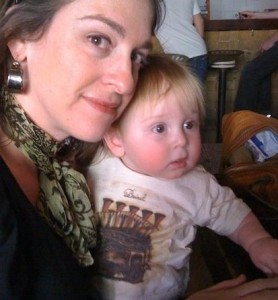
Amelia Kahaney, author of: The Brokenhearted and The Invisible (to be released in October 2014)
Age of kid: 5.5
What was your writing schedule (ideal and actual) like before kids, and how has that changed?
When I try to remember life before kids, it seems to me that I had endless time to write and that I squandered most of it. I wasn’t a novelist yet before I had my son. I wrote short stories, which took a lot of time get right. So much time, in fact, that many of them never became right at all and sit to this day on my hard drive, never to be published. I wrote during the day, mostly, or whenever I could squeeze it in. There was no rhyme or reason to how I organized my time back then. I had one writer friend who wrote every day and was fanatical about preserving her rituals and schedule, and I remember thinking I could never be like that.
I sometimes let myself believe that before kids, I was never tired or taxed. But that can’t be true. Life is hard, with or without children. I’m sure I was tired a lot of the time, though it seems like nothing compared to what would come after motherhood. I know one thing for sure: My mind was sharper than it is now. In my graduate school days and directly after, it gleamed like a set of knives in a drawer, ready to be of use to me whenever I could force myself to sit down and write. But despite this sharpness, or maybe because of it, things were always so difficult for me emotionally when it came to writing. Every writing session was tinged with a sense of desperate confusion about who I was as a writer, what on earth I was supposed to be doing, where I was supposed to be headed. I would never have used the word “career” in regard to writing back then. It was just this weird, fretful occupation I had when I wasn’t busy making money, having relationships, or learning how to cook.
After that initial first six months of motherhood where it felt as if my life had imploded and Nothing Would Ever Be The Same Again, I began to try writing again. I remember turning in something new to my writing group when the baby was maybe nine months old and it was clear from their response that it was awful. Just unbearably bad. I went home and cried, and wondered if I’d forgotten how to write entirely and if this was it for me now, just baby and working for a paycheck and no room for anything artistic again. I worried about this for probably the first two years of my son’s life, even after I started to write again.
When my son was eleven months old, I started ghostwriting because I’d been laid off and we needed the money. And those books I ghostwrote were what changed everything. Suddenly writing was tied in a tangible way to money, and I had no choice but to devote myself to it as a serious practice. I wrote more intently and voluminously as a ghostwriter than I’d ever written on my own, and I learned in the year and a half or two years of that process that I could actually write novels. I don’ think I really believed I could do it, until I had to do it, for money.
Including the ghostwriting, I’ve written five novels since my son was born five years ago. This fact is astonishing to me. And though my brain still isn’t as sharp or gleaming as it used to be before motherhood, I’ve learned to have some discipline about the act of writing. The regularity of putting quite a lot of words on a page helps quiet the panic that used to always be such a huge part of the writing process for me. I now write most days, and I find enormous comfort in seeing the pages stack up in the Word document. And now I dare to use the phrase “writing career.” It only feels mildly fraudulent to say this now instead of straight-up preposterous.
How do you remain present for your family even when you’re sunk deep into a current project?
This is really tough for me, and I fail at it often. I think especially with my husband. It’s easy to devote the hour or two at the end of the day to getting on the floor and playing with your kid, whose needs are massive but simple. It can be harder with your partner, who wants to have a non-distracted ear, who wants the person he married to be there to hang out with him, rather than a shell of a human who is stressed, irritable, and feeling short on time due to the three hours she spent making play-doh animals when she should (in the insane, self-flagellating part of her mind) have found a way to be writing. On particularly stressful months when deadlines are looming, my husband will take my son both weekend days and they’ll go on excursions so that I can finish a book on time. When they come home, it’s clear they’ve had all this fun together and that I’ve missed it, and I can get pretty sad about that. I hate that the thing that is easiest to sacrifice in the name of work and parenthood is the time we used to invest in our marriage. It’s probably indicative of the period we’re living in, where kids rule the roost and get an extraordinary amount of our attention, and we forget that time with our partner, time with no kids in sight, is actually just as important.
I should also add that things have become much, much easier now that my son is in kindergarten. He goes to afterschool four days a week, and this is the first year where I feel like I actually have enough hours in the day to write, attend to my other job, and be a decent parent to my son. Now if only I could incorporate more time outside of the house with my husband, I’ll have truly cracked the code.
How has parenthood changed the work itself, if at all?
Parenthood made me more ruthless with myself in terms of weekly page counts. It’s much more important to me now to finish something than to get it perfect. The kind of books I’ve written have all been under very tight deadlines, and I’ve learned how to get them done on time with less and less stress each time. The added knowledge that as a parent I won’t often be able to work at night or first thing in the morning, the knowledge that my hours are extremely set, has probably forced me choose good over perfect more quickly than I would as a non-parent.
The other thing parenthood makes you do is consciously choose sanity over melodramatic hysteria. It’s more efficient to be sane, and I feel I’m doing less harm to my child if I try to embrace (sometimes forcibly) being calm and unflappable and reject being terrified and self-loathing, even though the latter are probably my more natural states of being when it comes to writing. Faking sanity goes a long way, I think. If you fake it enough, the anxiety and self-hatred kind of shrivel up and die a little, and you can get back to the work of putting words on the page.
What is the most challenging aspect of being a working artist and a parent?
I think I’d have to go with money. There’s never enough of it, and checks never come on time. It’s very stressful. Having a child in New York is not an economically easy thing to do under the best of circumstances, and then having the audacity to try to earn a living in the arts on top of it? You need ovaries of steel. A trust fund would also work in place of the ovaries, I’m told.
Do you have any advice to other writers with kids or who plan to have them?
When I was massively, waddlingly pregnant, someone I respected told me that Joyce Carol Oates had six children. I marveled at this fact – six children and she wrote close to 100 books! If JCO could do that, I reasoned, surely I could have one child and find the time to write a few books.
When my son was very small, there seemed to be no money and even less time, and suddenly I was expected to ghostwrite a novel in three months. It seemed impossible, so I would constantly tell myself, “Joyce Carol Oates had six children. Stop complaining.” This mantra helped me, a little.
But just this year it occurred to me to Google her, because suddenly the whole six kids thing seemed off. So I did. JCO had no children, in fact. Just a drive to write that was so powerful that in college she trained herself, she said, by “writing novel after novel and always throwing them out when I completed them.” The person who told me about her six children must have said it sarcastically, and I’d been pregnant enough not to get the joke.
So now that I don’t have JCO to fall back on, I’m left saying about writing with kids that many others have done it, so you can do it too. And the lucky thing is that birth control is available—you don’t have to have six children. Nor do you have to publish 80 novels. All you have to do is fake a semblance of sanity while your kids are small. As they grow up, enjoy the swaths of time you used to take for granted. And my biggest piece of advice is five words I keep taped to my laptop. They are good to remember as a goal for motherhood and writing both. It’s supposed to be fun. If it isn’t—and god knows it often isn’t—you’ve got to try your best to find your way back to the fun. That’s your biggest responsibility, as a parent and as an artist. Enjoy yourself enough so that others can enjoy themselves too.

Thank you SO MUCH for this post. You articulated so many thoughts that I didn’t even know I had – especially about the added challenge of balancing a spouse’s needs, too. You had me at the very first line about how there was so much time pre-kids and that you feel like you squandered it. I can’t count the number of times I’ve had this same thought. I made a resolution recently to speak with more honesty about the joys and challenges in my life – thanks for providing such a brave, compelling model.
Thanks for reading, Julie! And here’s to speaking honestly about it all, on both the good days and the nearly impossible ones.
I love your 5 word motto- It’s supposed to be fun. I’m not a writer but I have a full time job, a 5 year old and a 7 year old (and luckily a wonderful husband too). It really is supposed to be fun. I’ve been annoyed by the book that’s been in the news lately that claims parenting is all joy and no fun. Sorry, but if you’re not having fun you’re doing it wrong. I also frequently tell myself that for a parent the days are long and the years are so, so short.
I really enjoyed what you wrote. Thank you for sharing.
Thanks so very much for these words. I’m so tired yet still have the pull to write! I used to write quite a lot, and I’m struggling to wake up at 5am before my two small children (ages 2 and 4) wake up to do it. It’s so comforting to read this.